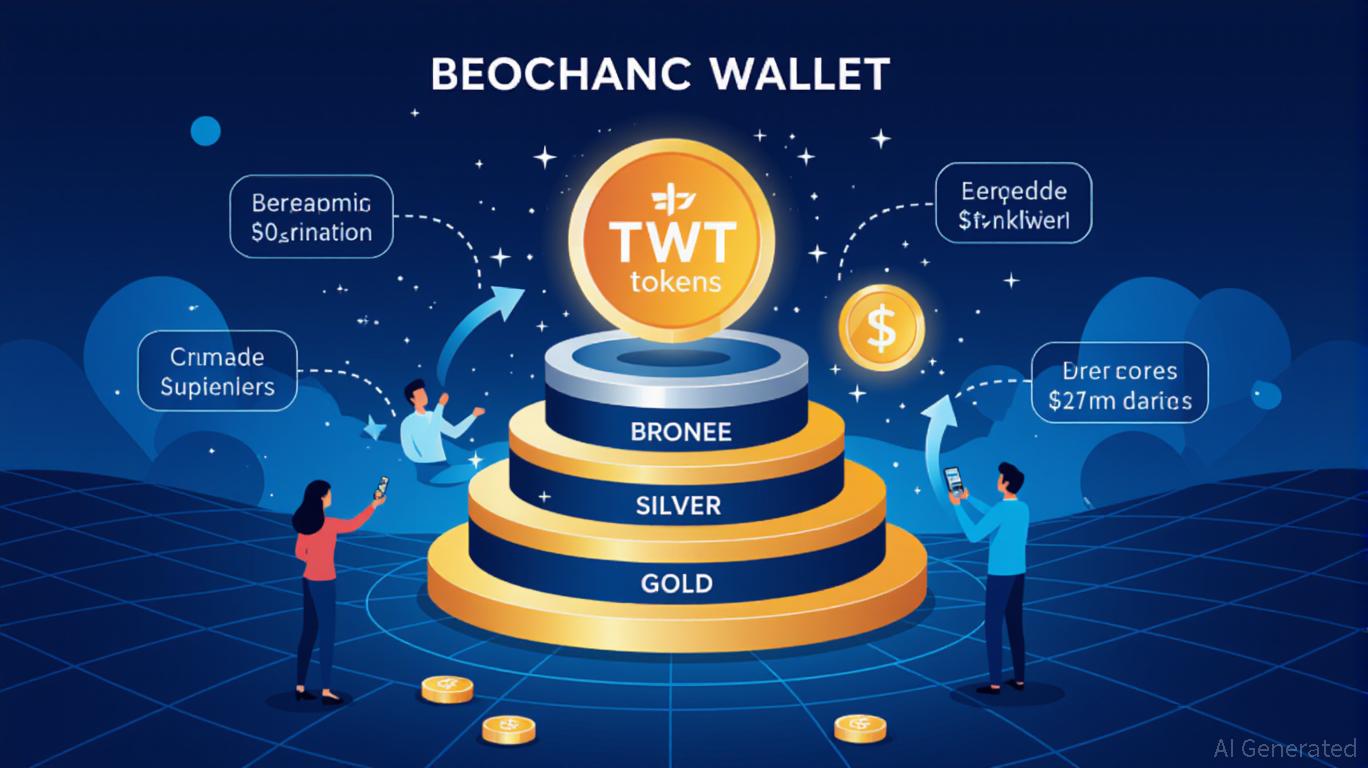TWT Introduces a Revamped Tokenomics Framework: Transforming DeFi Rewards and Influencing User Actions
- Trust Wallet's TWT tokenomics shift to utility-driven incentives via Trust Premium, replacing speculative governance with tiered rewards for user engagement. - FlexGas and RWA partnerships expand TWT's utility as a fee currency and bridge between DeFi and traditional finance, enhancing demand and scarcity. - Tiered rewards and token locking create flywheel effects, stabilizing supply while incentivizing long-term participation over short-term liquidity. - Challenges include Binance's collateral ratio cut
TWT’s Transformation: Shifting Focus from Governance to Utility
Trust Wallet’s overhaul of the
The structure of Trust Premium creates a reinforcing cycle: increased activity in Trust Wallet leads to more TWT earned or locked, which then boosts user benefits. This loop encourages ongoing involvement and helps decrease selling pressure on TWT, as users focus on long-term gains instead of immediate liquidity, as noted in
Gamified Utility: Redefining DeFi Incentives
TWT’s revised tokenomics bring in game-like rewards similar to conventional loyalty schemes but tailored for blockchain. For example, FlexGas, launched in August 2025, lets users pay transaction fees using TWT, USDT, or
Additionally, collaborations such as the partnership with
Adoption and User Behavior: Key Performance Indicators
Although comprehensive on-chain data for TWT after the Trust Premium launch is still limited, the program’s design naturally encourages notable changes in user behavior. Participants are now motivated to lock up TWT for longer periods, which could help stabilize the token’s supply and minimize price swings. The tiered rewards also promote regular, low-cost activity on Trust Wallet, cultivating consistent user engagement, as reported by
Industry experts believe that Trust Premium’s effectiveness will depend on its ability to turn passive holders into active users. By linking incentives to on-chain actions, Trust Wallet creates a system where user participation directly influences token value. This approach differs from high-yield staking models like ZKSync’s 10% annual cap, which focus on short-term profits rather than ecosystem development, as observed in

Potential Obstacles and Risks
No tokenomics framework is without its difficulties. TWT is currently facing challenges after Binance lowered its collateral ratio from 60% to 45%, which may reduce leveraged trading and institutional interest, according to
Despite these issues, they are not insurmountable. Trust Wallet’s emphasis on real-world applications—through FlexGas, RWAs, and tiered incentives—positions TWT as a more stable asset in a market often driven by speculation.
Final Thoughts: A Model for Lasting Growth
The updated TWT tokenomics illustrate the direction DeFi is heading: prioritizing user-focused rewards and sustainable value. By connecting token utility to the platform’s expansion, Trust Wallet is nurturing a community where participation is directly rewarded. Although hurdles remain, the move toward gamified, utility-based incentives provides a promising template for other blockchain ventures. For investors, TWT’s transformation highlights the significance of tokens that emphasize enduring adoption over fleeting excitement—a philosophy that could reshape DeFi in 2025 and beyond.
Disclaimer: The content of this article solely reflects the author's opinion and does not represent the platform in any capacity. This article is not intended to serve as a reference for making investment decisions.
You may also like
Algo +1.57% Propelled by Robust 7-Day Surge
- Algo (ALGO) rose 1.57% in 24 hours on Nov 9, 2025, with a 17.27% surge over seven days. - The 7-day rally signals short-term bullish momentum, though a 46.01% annual decline remains unresolved. - Technical indicators like RSI and MACD suggest continued upward trends, but analysts caution against long-term optimism. - Traders are advised to monitor volume and market conditions amid ALGO's distinct performance versus broader crypto trends.
YFI has surged by 13.08% over the past week as it experiences a robust short-term upward trend
- Yearn.finance's YFI token rose 0.47% in 24 hours, marking a 13.08% surge over seven days despite a 38.81% annual decline. - Analysts attribute the rally to accumulated buying pressure or improved trader sentiment, typical of DeFi's short-term volatility patterns. - Technical indicators suggest potential corrections post-rally, while backtesting historical 13.08% gains could reveal sustainability of the recent momentum.
AAVE Rises 8.63% Over the Past Week: DeFi Buyback Momentum and Treasury Advancements
- Aave's $50M annual buyback program shifts DeFi tokenomics toward deflation, redirecting protocol earnings to reduce $AAVE supply. - The 7-day 8.63% price surge reflects growing adoption of buyback strategies by DeFi platforms like EtherFi and Maple Finance. - BTCS Inc. leverages Aave's 24/7 automated lending to cut borrowing costs by 5-6% while expanding Ethereum holdings through DAT strategy. - Analysts predict deflationary models will enhance price resilience, with metrics like protocol revenue replaci
Zcash Surges Above $500, Marking Multi-Year Peak and Huge Trader Profits
